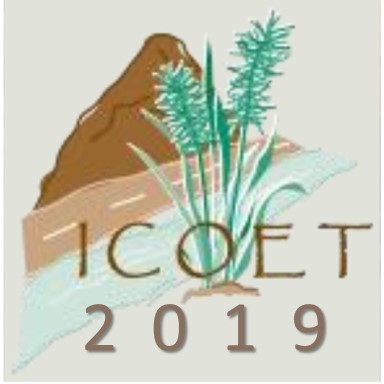International Conference on Ecology & Transportation - ICOET 2019
Sept. 22, 2019, 8 a.m. - Sept. 26, 2019, 3 p.m.
Organizer -
Road Ecology Center
Contact -
Fraser Shilling fmshilling@ucdavis.edu; 530-752-7859
ICOET 2019 - Transportation Ecology Workshop
Transportation systems and other linear infrastructure are some of the most visible and extensive of society’s use of landscapes. These networks of roads, highways, railways and other structures have their own impacts on natural systems, as well as carrying traffic and facilitating extraction from ecosystems. Based in contemporary science and technical practice, this workshop provides an introductory look at the ways that infrastructure and traffic impact ecosystems. Participants new to transportation ecology and those more experienced will gain knowledge and training in the techniques useful for evaluating and mitigating impacts. Instructors will cover a range of topics, including shorelines and sea level rise, impacts to terrestrial and aquatic ecosystems, movement of small to large wildlife, and a range of mitigation practices. Across all of these areas, instructors will emphasize the partnering and engagement that can help with the development of both the science and successful practice. The outcomes of this workshop are intended to provide a suite of practical measures and tools for both new and current experts in the linear infrastructure field.
Instructors: Wendy Collinson-Jonker (Endangered Wildlife Trust, Wildlife & Transport Programme); Kimberly Andrews (University of Georgia, Odum School of Ecology); Julia Kintsch (Eco-Resolutions, Owner-Founder); Fraser Shilling (UC Davis, Road Ecology Center).
DRAFT Curriculum
1. Instructor and Participant Introductions
2. Overview of transportation ecology and the pursuit of ecologically-sustainable transportation. Fraser Shilling (UC Davis)
3. Introduction to Interactions between Infrastructure and Ecology
A. Ecosystems and Infrastructure: How do we think about impacts of infrastructure on terrestrial ecosystems across scales? What methods can we use? (Fraser Shilling, UC Davis)
B. Climate Change, Infrastructure, and Habitat: Adapting shoreline infrastructure, ecosystems, and wildlife to climate change. New technologies, new partnerships. Kimberly Andrews (UGA)
Facilitated discussion of interactions between infrastructure and ecology.
Break
4. Introduction to Measuring and Mitigating Impacts on Wildlife
A. Global practices in measuring wildlife conflict with infrastructure. Technical advances and approaches for partnering with business, government, the public. Wendy Collinson-Jonker (EWT)
B. Stakeholder engagement to understand and mitigate transportation impacts on wildlife. Best practices in telling stories with good data and images and working with partners. Julia Kintsch (Eco-Resolutions)
Facilitated discussion of measuring and mitigating impacts on wildlife
Wrap-up
Finish
|
|
|
Wendy Collinson-Jonker manages the Endangered Wildlife Trust’s Wildlife and Transport Programme, a conservation NGO in South Africa. Most recently she inspired the first African Conference on Linear Infrastructure and Ecology (ACLIE). She and her organization developed the first systematic program for evaluating and mitigating wildlife-vehicle conflict (WVC) in Africa. She is a global expert in ways to report and evaluate WVC and will describe contemporary ways to collect data about wildlife mortality associated with linear infrastructure. She will discuss the importance of relationships with stakeholders ranging from industry to members of the public.
|
|
Dr. Kimberly Andrews is a professor at the University of Georgia, Odum School of Ecology. Her lab conducts ecological research that guides the conservation of native wildlife populations and ecosystems. She focuses on applied management with emphases on wildlife spatial ecology and developing approaches for retaining or restoring quality habitats and ecological viability in altered landscapes. She will describe issues associated with herpetofauna and transportation systems. She will also talk about how shoreline ecosystems and infrastructure are changing in response to sea level rise, and how they can be adapted by committed partners.
|
|
Julia Kintsch is founder of Eco-Resolutions, a woman-owned ecological resource consulting company in Golden, Colorado. She works with private, government and nonprofit clients to achieve innovative conservation solutions in arenas ranging from transportation to energy to community planning. She combines technical expertise with collaborative problem-solving for clients interested in efficiency, economy and ecosystem health. She has extensive experience in developing guidelines and recommendations for road-wildlife mitigation and will share this experience and knowledge with workshop participants.
|
|
Dr. Fraser Shilling is Co-Director of the Road Ecology Center, UC Davis and organizer of ICOET-2019. He has studied impacts of transportation systems on ecology for most of the last 20 years. He looks at how shoreline infrastructure can be adapted to sea level rise in ways that don’t impact shoreline ecosystems. He has developed online systems for collecting and managing data on WVC and from camera trap systems. He has worked with NGOs, counties, states, and national governments on various ecological issues related to transportation infrastructure. He will introduce the workshop.
|
